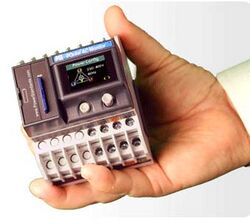Engineering:PQube
 |
PQube is a registered trademark[1] of Power Standards Lab for an electronic measuring instrument that records power quality and electric energy on the electric power grid.
Applications
PQube instruments are widely used to gather data for academic research,[2][3][4] and at United States Department of Energy National Laboratories[5] and state energy regulators.[6] U.S. federal government agencies use PQubes to detect power quality issues – for example, the Federal Aviation Administration tracks disturbances at radar control centers.[7]
Each PQube instrument is traceable to the National Institute of Standards and Technology, so often these instruments are used in international academic and research environments.[8][2]
PQubes are a key element in many smart grid projects,[9][10] recording power disturbance and power flow data to examine efficiency and reliability effects.
Information on the Web
Approximately 50 PQubes, located in approximately 40 countries, have been designated by their owners as free public sources of information at http://map.pqube.com . The site is updated approximately every 2 minutes with worldwide power quality and energy recordings.
Data from these PQubes can be used, for example, for developing and testing power quality algorithms.[11][12] [13] Available data include daily, weekly, and monthly files in GIF and Microsoft Excel CSV format. Voltage and current oscillographs are recorded during every power disturbance and these worldwide locations, and are freely available. Data from each worldwide site is updated approximately once per minute.
References
- ↑ U.S. Trademark 78,587,957
- ↑ 2.0 2.1 Timens, R.B. (2011). "High harmonic distortion in a new building due to a multitude of electronic equipment". 2011 IEEE International Symposium on Electromagnetic Compatibility. pp. 393–398. doi:10.1109/ISEMC.2011.6038343. ISBN 978-1-4577-0812-1. https://ris.utwente.nl/ws/files/5483717/070_188.pdf.
- ↑ S. Dawson-Haggerty (February 2012). "Experiences Integrating Building Data with sMAP". http://www.eecs.berkeley.edu/Pubs/TechRpts/2012/EECS-2012-21.pdf.
- ↑ T. Peffer (October 2010). "UC Berkeley's Cory Hall: Evaluation of Challenges and Potential Applications of Building-to-Grid Implementation". California Institute for Energy and the Environment. http://uc-ciee.org/downloads/WhitepaperBuildingtoGrid.pdf.
- ↑ Using Dashboards to Improve Energy and Comfort in Federal Buildings", K. Marini, Lawrence Berkeley National Lab, University of California eScholarship
- ↑ "Verification of EnergyNet Methodology", California Energy Commission, December 2010
- ↑ "Programming and Operation of the PQube", Course by Federal Aviation Administration, June 2012
- ↑ "Monitorização em tempo-real de parâmetros de qualidade da rede elétrica a partir de diferentes locais em Portugal Continental", N. M. Salgado Campos, February 2012
- ↑ "Integrating GridAgents into SmartGrid Applications", D. Cohen et al., November 2010
- ↑ "Metering Plan", J.E. Pope, July 2012
- ↑ Ozgonenel, O.; Thomas, D.W.P.; Yalcin, T. (2012). "Superiority of decision tree classifier on complicated cases for power system protection". 11th IET International Conference on Developments in Power Systems Protection (DPSP 2012). p. 134. doi:10.1049/cp.2012.0054. ISBN 978-1-84919-620-8. https://doi.org/10.1049/cp.2012.0054.
- ↑ "Voltage Quality in Urban and Rural Areas", Timens et al., Netherlands, 9/2012
- ↑ "Fukushima, Mexico and Slovenia: Free Electric Power Recordings for Researchers"
External links
- Data from the PSL PQube, Power Standards Lab
 |
